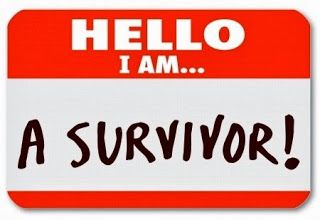One word so much confusion...
Survivor: one simple word surrounded by so much confusion but yet so much meaning.

How can one word be so confusing, yet so important?
Have you ever stopped and wondered when is a cancer patient technically a survivor? Often times those that have been diagnosed with the disease along with several national organizations have different definitions of the word cancer survivor. The word cancer survivor has so much meaning, and each one identifies with it differently.
Before the National Coalition for Cancer Survivorship (NCCS) was formed, many defined cancer survivor as someone who had been free of any sign of the disease for 5 years. According to the National Cancer Institute, a survivor is “One who remains alive and continues to function during and after overcoming a serious hardship or life-threatening disease. In cancer, a person is considered to be a survivor from the time of diagnosis until the end of life.”
With so many definitions it becomes easy to see why patients become overwhelmed when asked, “Are you a survivor?” I recently had a chance to sit down with cancer survivors at the 24 Hours in the Canyon Cancer Survivorship Center and ask them when they considered themselves a survivor. Let’s face it: many of us don’t think much about the technicalities of the word survivor, but I quickly learned that cancer survivors take those two words to heart. The answers that I received when asked when did you consider yourself a survivor were all so different. They ranged from “I was a survivor the last day of radiation treatment”, to “after the surgery when I felt all the cancer was removed”, to “I am not a survivor yet and don’t know when I will be”, “I think I am in denial over it all”, and finally, “when I got released from the doctors.”
How do we, as healthcare providers, use the word cancer survivor? I think we have to take it on an individual basis. I have heard that many do not want to be called a survivor, but instead a thriver. And even for those that have metastatic disease many think that survivor doesn’t apply to them, but would prefer to be called a “lifer”. I think we need to be sensitive to each one, but yet encourage them. Let them understand that they are a survivor from the moment of diagnosis, but may just be in a different stage of the process. They survived just hearing, “You have cancer,” and those words are a hard pill to swallow. So if it’s survivor, thriver, or even a lifer each one is a SURVIVOR.
Cancer survivorship involves much more than the label “survivor.” Survivorship focuses on living with, through, and beyond cancer. No matter what stage one may be in, survivors should take extra measures to live a healthier life. Now is the time to encourage them more than ever. The two major things we can control in life that can help reduce cancer risk is diet and exercise. Not only do they need to focus on those two aspects, they also need to focus on their mental health. This can be done through activities like music, art, meditation, and/or counseling. Survivorship programs can give the survivor, thriver, or even the lifer the extra support they need. The common goal is to improve their quality of life.



